For teams that rely on visual project management, Trello is often the go-to tool. However, many teams are now looking for a self-hosted Trello alternative to avoid relying on an external provider for their data and workflows. A self-hosted Trello alternative offers greater control, allowing you to manage your boards on your own server or VPS. This approach provides more flexibility, enhances data privacy, and can significantly reduce long-term costs while keeping you independent from third-party outages or policy changes.
Benefits of Self-Hosting Over Cloud-Based Solutions
Choosing a self-hosted Trello alternative provides more than just independence and offers a new level of control over your project data It changes the way your team handles data, security, and scalability.
Data remains under your jurisdiction
Instead of sending sensitive information to external servers, all tasks and attachments are stored locally or on your VPS. This can be crucial for companies with strict compliance rules.
Customize features and security policies
You can install only the plugins you trust, enforce encryption methods of your choice, and integrate with internal tools that a cloud platform might not support. This level of control helps maintain compliance with organizational standards and ensures the system evolves to match your team’s specific requirements over time.
Mitigate reliance on vendors
Vendor lock-in is a common issue. Self-hosting gives you the freedom to switch or modify software without waiting for a provider to approve changes.
Cost-effective over time
For small teams, SaaS pricing may seem manageable, but costs grow quickly as you add users or premium features. Running a single VPS for a Trello self-hosted setup often pays off within months.
Key Features to Look for in a Self-Hosted Trello Alternative
Not every self-hosted tool will fit your workflow. Evaluating features carefully helps avoid future migration headaches.
- Kanban boards and drag-and-drop UI – A simple, visual interface is vital for team adoption. Look for smooth card movement and customizable columns.
- Granular multi-user permissions – As teams grow, you need to assign roles and control who can edit, move, or delete tasks. Strong permission systems prevent accidental data loss.
- Trello import support – Migration tools save time. If your new system can import Trello JSON or CSV exports directly, the transition will be far smoother.
- Integrations – Connections with Git repositories, chat systems, calendars, or CI/CD pipelines can turn a Kanban board into a central workflow hub.
- Mobile and desktop access – Teams often need to update tasks on the go. A responsive web interface or native app makes it easier to keep everyone in sync.
- Reliable backup and upgrade mechanisms – Self-hosting means you handle disaster recovery. Look for tools with documented backup methods and clear update paths.
Top Self-Hosted Trello Alternatives
There are several strong contenders when it comes to replacing Trello with a self-hosted solution. Each tool offers different strengths, from familiar interfaces to advanced agile features. Below are some of the most popular Trello self-hosted options you can deploy on your own server or VPS.
Wekan
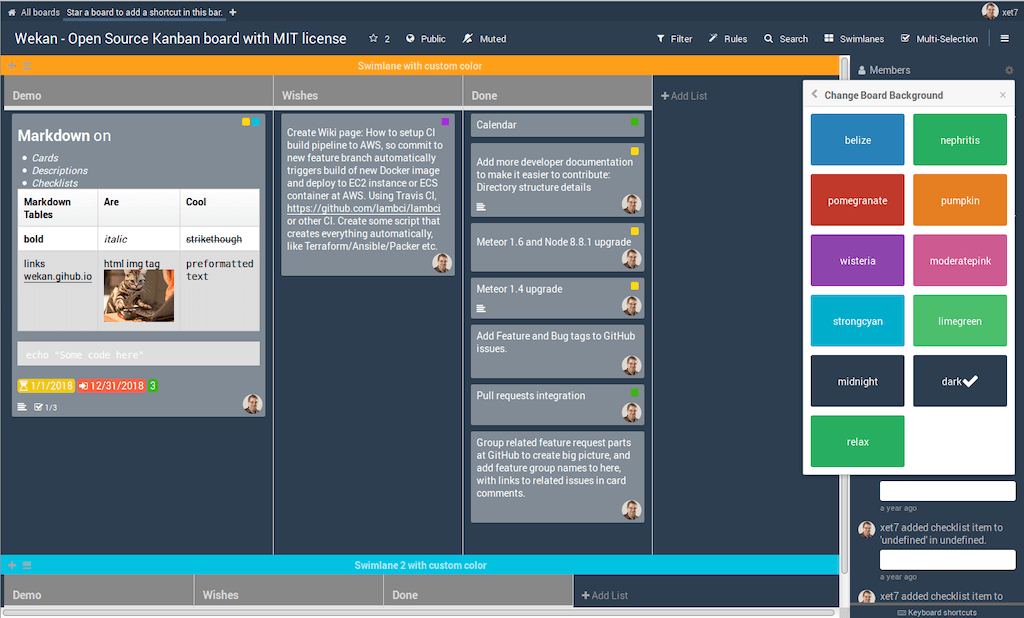
Wekan offers a layout almost identical to Trello, making it one of the easiest tools for teams to adopt.
- Familiar interface – The card and column system mirrors Trello, so teams can transition with little to no training.
- Migration options – Built-in Trello import and export tools simplify moving existing boards.
- Extensive customization – You can enable custom fields, labels, and swimlanes to adapt the board structure to different workflows.
- Active community – As an open-source project, it benefits from regular updates and user-created extensions.
Focalboard (Mattermost Boards)
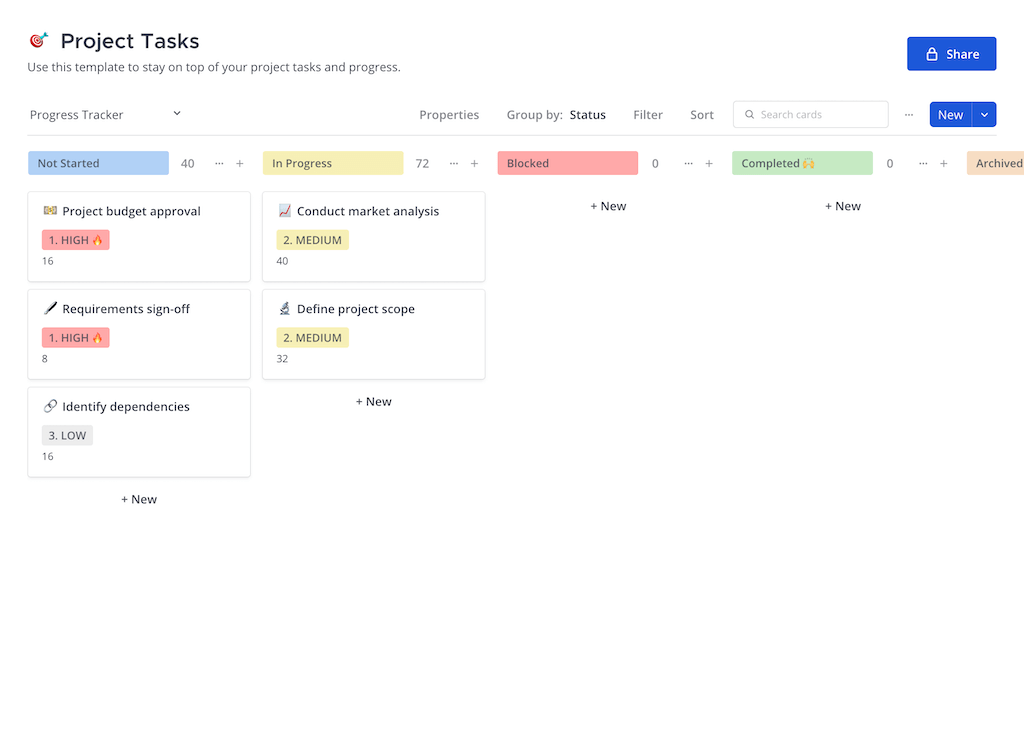
Focalboard is lightweight and integrates well with teams already using Mattermost for communication.
- Flexible editions – It offers both a personal server version for individuals or small groups and a team-focused edition for larger organizations.
- Clean design – The interface is simple and modern, which makes task management less cluttered and easier to navigate.
- Docker support – Deployment with Docker or Docker Compose takes minutes and ensures consistency across environments.
- Template system – Pre-built templates for different project types help teams get started quickly without building everything from scratch.
Planka
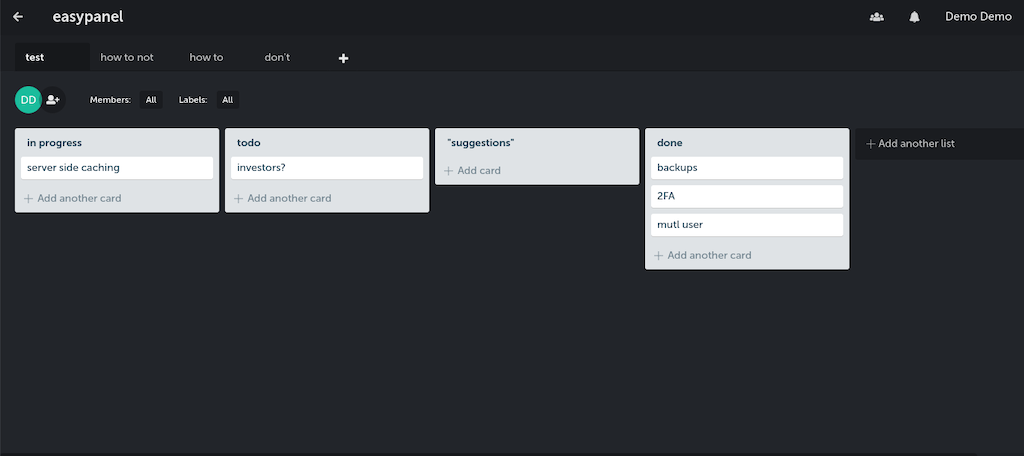
Planka provides a modern look and real-time updates, making it appealing for small teams that want a fresh interface.
- Lightweight setup – Designed to be minimal, it runs well on low-resource VPS instances.
- Real-time collaboration – Changes appear instantly to all users, which keeps teams in sync without manual refreshes.
- Docker deployment – Easy containerized setup makes maintenance and updates simple.
Restyaboard
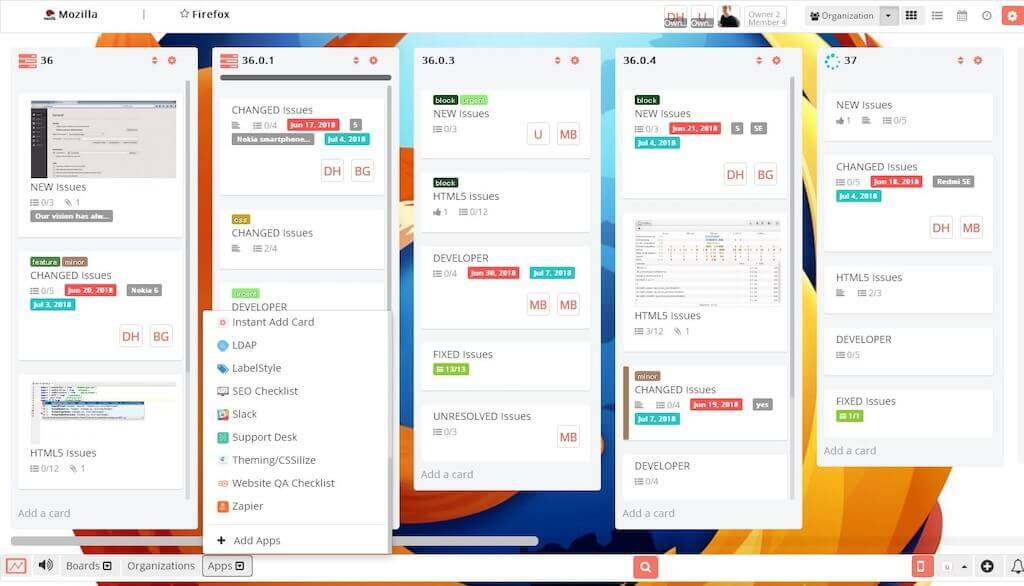
Restyaboard is built with Trello users in mind and adds features for offline use.
- Offline sync – You can keep working when the network is down, and changes sync when the server reconnects.
- Plugin support – Its plugin system allows you to add functionality as your team grows.
- Trello import – Built-in migration options make it a strong choice for moving existing boards.
Taiga

Taiga caters to teams using agile methodologies and combines both Kanban and Scrum boards.
- Dual workflow support – You can switch between Kanban for visual task management and Scrum for sprint planning.
- Backlog management – Built-in tools make it easy to handle product backlogs and prioritize features.
- Team collaboration – User roles and permissions are designed for agile teams, balancing flexibility with control.
Kanboard
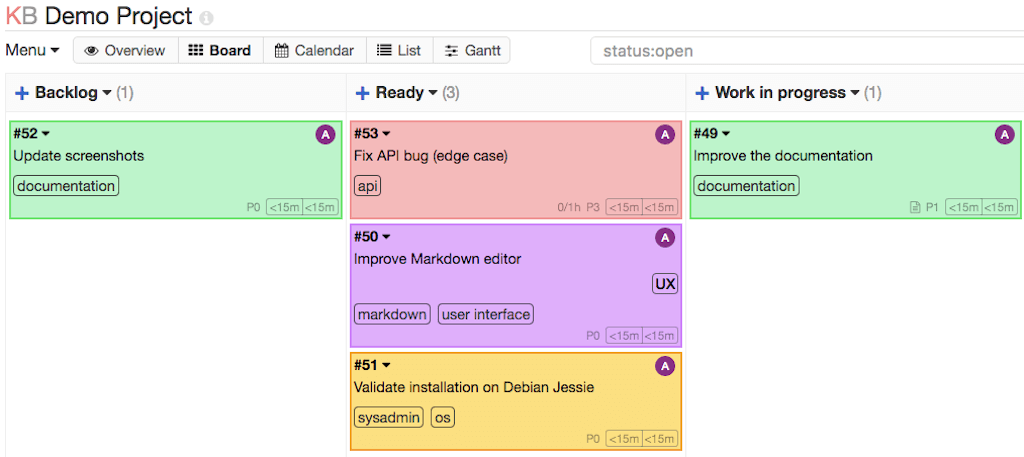
Kanboard is minimalist and focuses on simplicity and efficiency.
- Lightweight footprint – It runs on very modest hardware, making it ideal for budget VPS hosting.
- Advanced features – Despite its simple UI, it offers recurring tasks, Gantt charts, and custom analytics.
- Easy deployment – You can install it via Docker or by simply copying files to a PHP server.
How to Choose the Right Alternative for Your Needs
If you decide to self-host Trello alternatives, matching the software to your team’s needs saves time and avoids unnecessary complexity.
Team size and technical skills
If your team lacks Linux or Docker experience, a PHP-based option like Kanboard may be easier to maintain. Wekan and Focalboard require more technical setup but offer richer features.
Budget and hosting
Even entry-level VPS plans can handle these tools. A 1-2 vCPU, 2 GB RAM instance is often enough for small to medium teams.
Migration requirements
If you have existing Trello boards, prioritize tools with import features to avoid rebuilding everything manually. This can save hours of work and ensures that card details, labels, and checklists remain intact during the transition.
Integrations and extensions
Agile teams may lean towards Taiga for its Scrum features, while developers might prefer Focalboard or Wekan for integration flexibility. Choosing a tool with strong integration support also allows you to connect your boards with existing workflows, reducing friction and improving overall productivity.
Deployment and Maintenance Tips for Self-Hosted Tools
Hosting your own project management tool requires some planning. Following best practices ensures smooth operation and minimal downtime.
- Use Docker or Docker Compose – Containerization makes deployments consistent across servers and simplifies upgrades. Many of these tools provide official Docker images.
- Automate backups – Set up daily backups of both the application and database. This protects against accidental deletion or server failure.
- Apply security patches regularly – Keep both the server OS and the application updated to reduce vulnerabilities.
- Enable HTTPS and firewalls – Encrypt traffic with a free SSL certificate and restrict open ports to limit exposure to attacks.
- Monitor performance – Even small boards can grow in size. Keeping an eye on resource usage ensures you can scale your VPS before hitting limits.
Migrating from Trello to a Self-Hosted Solution
When you choose to self-host Trello boards, moving your workflow from the cloud doesn’t have to be disruptive. Careful preparation makes the switch seamless.
- Export data properly – Use Trello’s JSON or CSV export to capture all boards, cards, and attachments.
- Match user accounts – Create corresponding user accounts in the new system to maintain card assignments and permissions.
- Test a pilot migration – Import a small board first to verify formatting, labels, and checklists before doing a full migration.
- Train your team – Provide quick guides or a short session to get everyone familiar with the new interface and features.
Conclusion
Self-hosted Trello alternatives give you freedom, customization, and data ownership that cloud services can’t match. Whether you choose Wekan for familiarity, Focalboard for integration with team messaging, or Kanboard for its lightweight design, hosting on your own VPS puts you in control. If you’re ready to move away from subscription costs and vendor lock-in, deploying your board on VPS.us is a straightforward way to take charge of your project management infrastructure.
Hosting Your New Project Management Tool on VPS.us
When you are ready to deploy your self‑hosted Trello alternative, the VPS.us KVM2-US plan is a perfect fit. With 2 vCPU cores, 2 GB RAM, and fast SSD storage, it delivers the performance needed to run tools like Wekan or Focalboard seamlessly. Full root access makes it easy to set up Docker or lightweight PHP apps, giving you complete control over your project data while keeping everything secure and independent from third‑party platforms.



